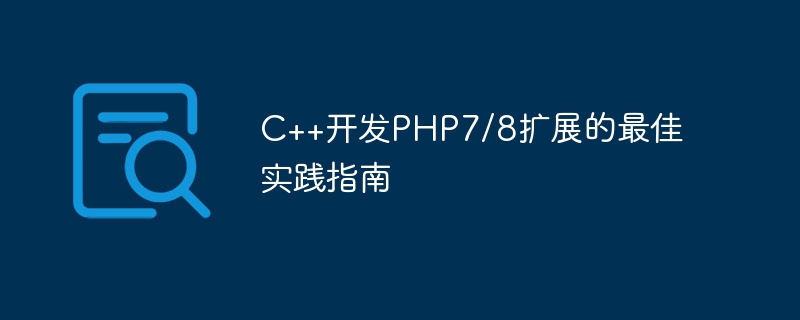

C Best Practice Guide for Developing PHP7/8 Extensions
With the development of the PHP language, more and more developers hope to improve PHP through extensions Functionality and performance. As an efficient, object-oriented programming language, C provides good support for developing PHP extensions. This article will introduce and summarize the best practices for developing PHP7/8 extensions in C, helping developers better use C to develop PHP extensions.
Before starting to develop PHP extensions in C, it is very important to understand the internal structure and API of PHP. The source code of PHP is open source and provides rich APIs through which developers can access and operate PHP's internal data structures. By becoming familiar with PHP's internal structure and API, you can better understand the development process of PHP extensions.
Zend is the core part of the PHP engine, which defines most of PHP's internal data structures and functions. In the process of developing PHP extensions in C, you can use Zend macros to access and manipulate PHP's internal data structures. Zend macros provide many convenient operation functions to simplify the development process.
PHP-CPP is a C library specifically designed for developing PHP extensions. It provides a set of object-oriented APIs through which PHP classes, methods and properties can be easily created. Using the PHP-CPP library can greatly simplify the development process of PHP extensions, while providing a wealth of tools and functions.
C supports object-oriented programming, which can better organize and manage code. In the process of developing PHP extensions, you can use C's classes, inheritance, polymorphism and other features to design and implement extensions. By rationally using object-oriented features, the readability and maintainability of the code can be improved.
Exception handling is a commonly used error handling mechanism. In the process of developing PHP extensions in C, you can use exception handling to handle and catch exceptions. By using exception handling mechanisms, you can make your code more robust and reliable.
Performance is an important issue to consider during PHP extension development. In the process of developing PHP extensions in C, you can combine PHP performance tuning techniques and use C optimization methods to improve the performance of the extension. For example, use appropriate data structures, reduce memory allocation and release, use efficient algorithms, etc.
Testing and debugging are key to ensuring the quality of your extension. After development is completed, you can use PHP's unit testing tool to test to ensure the functionality and stability of the extension. At the same time, problems can be easily located and repaired through the appropriate use of debugging tools.
Summary:
C Developing PHP7/8 extensions requires a certain understanding of the internal structure and API of PHP, using Zend macros for operations, using the PHP-CPP library for development, and making full use of C Object-oriented features, use reasonable exception handling mechanisms, perform performance optimization, and conduct appropriate testing and debugging. By following these best practices, developers can develop PHP extensions more efficiently and elegantly, improving PHP functionality and performance. At the same time, these practices can also be used as a reference for developing other extensions in C. Only through continuous learning and practice can one become an excellent PHP extension developer.
The above is the detailed content of Best practice guide for developing PHP7/8 extensions in C++. For more information, please follow other related articles on the PHP Chinese website!




